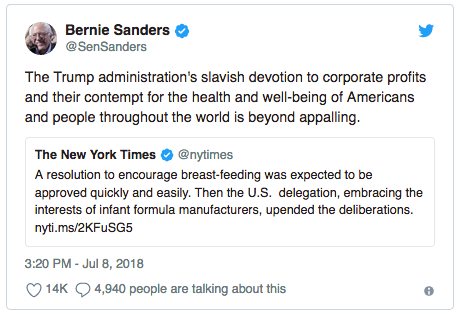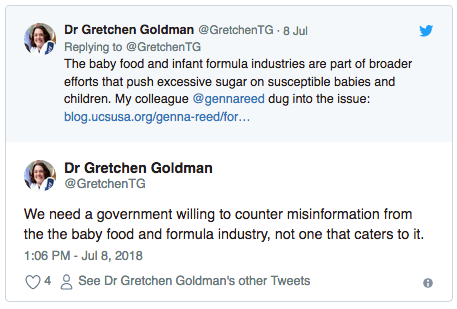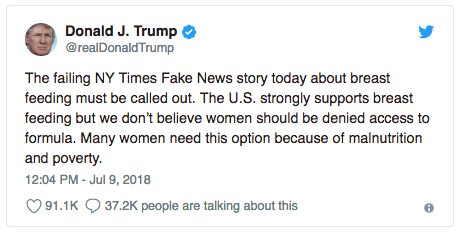U.S. Opposition to Breastfeeding Resolution Stuns the World
Trump took to Twitter on Monday to call the New York Times report “fake news.”

Decades of research has revealed time and again that breastfeeding is the healthiest way to feed babies. Years of misleading marketing by formula companies has caused undue harm the world over by providing free samples in-hospital after birth, driving the unintended use of dirty water to mix formula where clean water is scarce and miseducating mothers that the formula itself is an adequate replacement for breastmilk. Despite this, representatives from the United States put the interests of the multi-billion dollar baby food industry over the wellbeing of countless mothers and their infants at the United Nations-affiliated World Health Assembly (WHA) in Geneva.
While not all women want or are able to breastfeed, research clearly shows the health and economic benefits to both mothers and babies. The resolution proposed by Ecuador aimed at introducing a global education initiative encouraging breastfeeding, was based on these simple facts. But during a conference in Geneva last May, the U.S. delegation pressured Ecuador to abandon its plans to introduce a global resolution encouraging the practice.
The U.S. delegation, led by Health and Human Services Secretary Alex Azar, first attempted to weaken the resolution by removing a section calling on lawmakers to restrict advertising and promotion of certain food products that have a negative effect on children’s health and development, as well as language calling for governments to “protect, promote and support breastfeeding.”
According to a 2009 report by Dr. Alison Stuebe, some of the risks of choosing the formula over breast milk when it is not medically necessary include:
“an increased incidence of infectious morbidity, as well as elevated risks of childhood obesity, type 1 and type 2 diabetes, leukemia, and sudden infant death syndrome. For mothers, failure to breastfeed is associated with an increased incidence of premenopausal breast cancer, ovarian cancer, retained gestational weight gain, type 2 diabetes, myocardial infarction, and the metabolic syndrome.”
Health officials have noted that the U.S.’ downplay of the importance of breast milk mirrors the platforms of companies that manufacture infant formula, such as Nestlé and Abbott Laboratories, both of which have been the targets of massive campaigns to boycott the companies due to the harm their formula advertising tactics inflict.
After those attempts failed, the U.S. resorted to threatening the Latin American country. According to the New York Times:
“The Americans were blunt: If Ecuador refused to drop the resolution, Washington would unleash punishing trade measures and withdraw crucial military aid.”
The U.S. delegation also threatened the WHA with cuts to their funding of the World Health Organization (WHO). The WAH is the governing body for WHO and the United States is its largest contributor, having provided the organization with $845 million last year alone.
Breastfeeding advocates were left scrambling to find a sponsor for the resolution when, at least a dozen countries backed off “citing fears of retaliation,” according to the Times. Public health officials were left stunned by the actions of the U.S. representatives.
The Russian delegation stepped in to reintroduce the resolution, ultimately rendering the efforts by the U.S. delegation largely unsuccessful.
"We're not trying to be a hero here," stated one Russian delegate.
"We feel that it is wrong when a big country tries to push around some very small countries, especially on an issue that is really important for the rest of the world.”
The New York Times reported that lobbyists from the $70 billion baby food industry were present at the Geneva meetings, but they were not seen directly playing a role in the tactics used by the representatives from the U.S.
Patti Rundall, policy director of the British advocacy group Baby Milk Action, told the Times:
"We were astonished, appalled, and also saddened. What happened was tantamount to blackmail, with the U.S. holding the world hostage and trying to overturn nearly 40 years of consensus on best way to protect infant and young child health."
U.S. Senator Bernie Sanders took to Twitter to express his indignation with U.S. attempts to derail the resolution.
Dr. Gretchen Goldman, Research Director, Center for Science and Democracy expressed concern on social media for the U.S.’ actions:
A recent study in The Lancet revealed:
“The deaths of 823,000 children and 20,000 mothers each year could be averted through universal breastfeeding, along with economic savings of $300 billion.”
Trump reacted to the New York Times report on Monday, tweeting:
"The failing NY Times Fake News story today about breast feeding must be called out. The U.S. strongly supports breast feeding but we don’t believe women should be denied access to formula. Many women need this option because of malnutrition and poverty.”
Top Photo | A baby is fed a milk with a nursing bottle on a stroller at a shopping mall in Beijing, China, Wednesday, Aug. 7, 2013. (AP/Andy Wong)
Steemit → steemit.com/@emmafiala
Patreon → patreon.com/emmafiala
MintPress News → mintpressnews.com/author/emma-fiala
Facebook → facebook.com/emma.fiala.7
Twitter → twitter.com/bymyelf



What will these formula companies do next ? Claim that water is not a human right and should be privatized ? Oh wait, Nestle has already done that.
Breastfeeding is the nature and nature is good.
Curated for #informationwar (by @commonlaw)
Our purpose is to encourage posts discussing Information War, Propaganda, Disinformation and other false narratives. We currently have over 7,500 Steem Power and 20+ people following the curation trail to support our mission.
Join our discord and chat with 150+ fellow Informationwar Activists.
Connect with fellow Informationwar writers in our Roll Call! InformationWar - Contributing Writers/Supporters: Roll Call Pt 8
Ways you can help the @informationwar